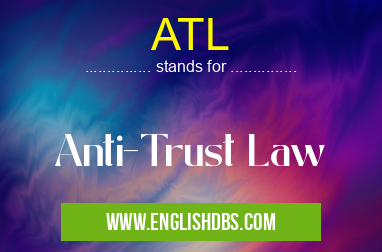What does ATL mean in LAW & LEGAL
ATL, or Anti-Trust Law, is a legal framework designed to protect consumers and promote fair competition in the marketplace.

ATL meaning in Law & Legal in Governmental
ATL mostly used in an acronym Law & Legal in Category Governmental that means Anti-Trust Law
Shorthand: ATL,
Full Form: Anti-Trust Law
For more information of "Anti-Trust Law", see the section below.
ATL Meaning in GOVERNMENTAL
ATL is a crucial component of governmental regulations, ensuring that businesses adhere to fair practices and do not engage in anti-competitive behaviors that could harm consumers or the economy.
ATL Full Form
The full form of ATL is Anti-Trust Law.
What does ATL Stand for?
ATL stands for:
- A: Anti-
- T: Trust
- L: Law
Essential Questions and Answers on Anti-Trust Law in "GOVERNMENTAL»LAW"
What are Anti-Trust Laws (ATL)?
ATL are regulations designed to prevent anti-competitive practices and promote economic fairness. They aim to protect consumers from monopolies, cartels, and other forms of market manipulation.
What is the Sherman Antitrust Act?
Enacted in 1890, the Sherman Antitrust Act is the cornerstone of ATL in the United States. It prohibits agreements and practices that restrain trade, such as price fixing and mergers that reduce competition.
What is the Clayton Antitrust Act?
The Clayton Act of 1914 supplements the Sherman Act by addressing specific anti-competitive practices, such as price discrimination, exclusive dealing, and interlocking directorates.
What is the purpose of ATL?
ATL aims to:
- Protect consumers from inflated prices and limited choices.
- Promote fair competition and innovation.
- Prevent monopolies and ensure a level playing field for businesses.
- Maintain economic growth and stability.
What are some examples of ATL violations?
Violations include:
- Price fixing agreements between competitors.
- Cartels that control market supply or prices.
- Mergers that create monopolies or significantly reduce competition.
- Exclusive dealing contracts that prevent competitors from entering the market.
What are the consequences of violating ATL?
Violations can lead to:
- Civil lawsuits with potential for damages and injunctions.
- Criminal prosecution with fines and imprisonment.
- Disgorgement of ill-gotten profits.
- Breakup of companies to restore competition.
How are ATL enforced?
Enforcement is primarily handled by the Federal Trade Commission (FTC) and the Department of Justice's Antitrust Division. They investigate complaints, conduct investigations, and pursue legal action against violators.
Final Words: ATL is a fundamental aspect of governmental regulations, safeguarding consumers from harmful business practices and fostering a healthy and competitive market environment.
ATL also stands for: |
|
| All stands for ATL |
